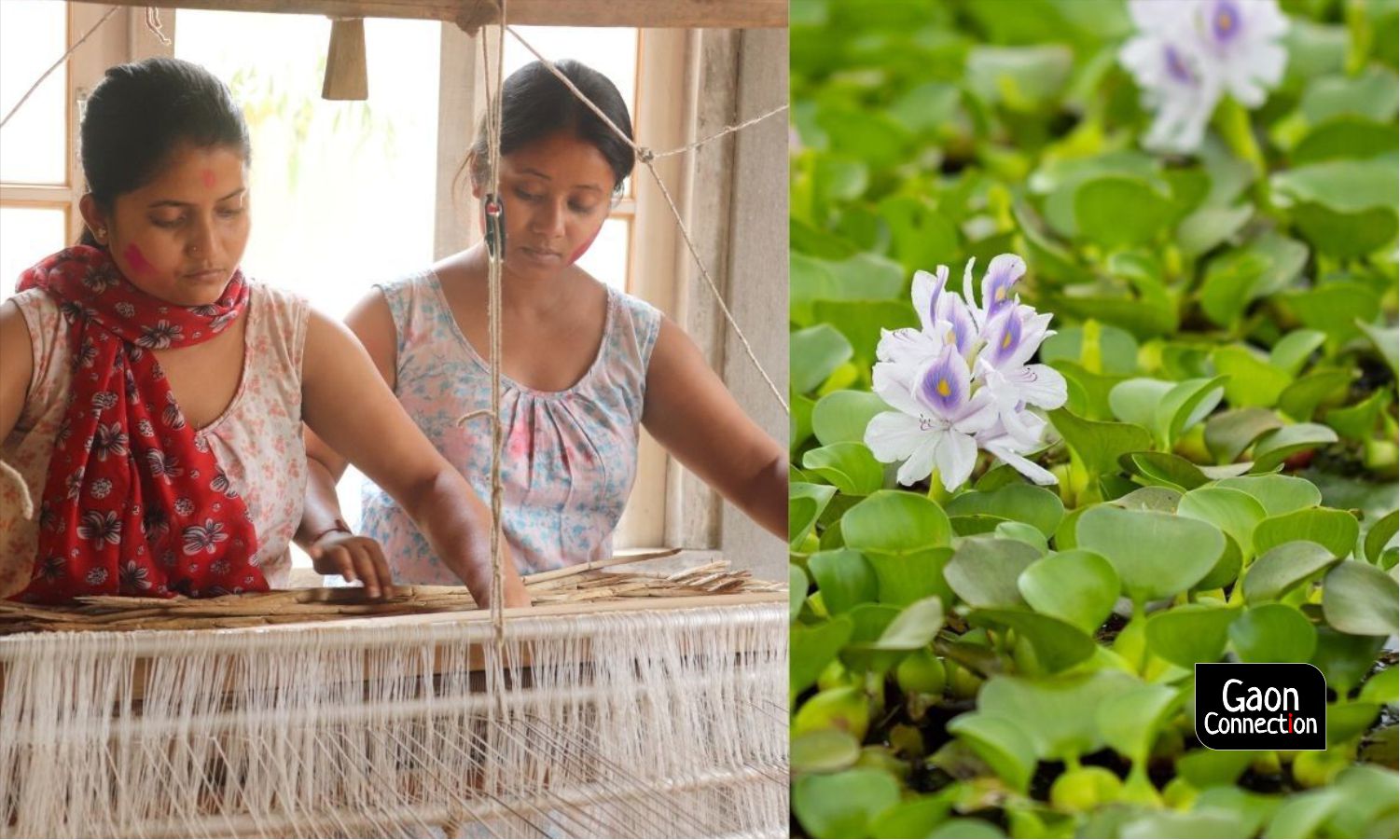The water hyacinth, pretty as its name sounds, is a nightmare for those who are restoring water bodies. Just a small patch of the aquatic plant spreads out, and in no time at all the entire lake is covered in it, blocking the sunlight and killing aquatic life.
Hitherto considered a highly problematic invasive species, the water hyacinth has improved its reputation somewhat with the Meghalaya-based North East Centre for Training and Research (NECTAR) initiating a project in Assam, where the invasive plant is turned into sturdy yoga mats.
In Guwahati, Assam, huge portions of the Deepor Beel, a Ramsar protected water body, is covered in water hyacinth, but now local inhabitants, mostly women, are employed in using them to weave mats.
“Using the water hyacinth for handicrafts is not new to this part of the country,” Arun Kumar Sharma, director of NECTAR (an autonomous society, set up under the department of Science & Technology, Government of India), told Gaon Connection.
He added that they decided to initiate proper training programmes so that the women could put their weaving skills to better use and have a better source of income. “The yoga mat was one of the ideas we came up with and it is doing well,” Sharma said.
Rumi Das, Sita Das, Mamoni Das, Mitali Main Das, Mitali Das and Bhanita Das were the first six trainees who belong to a fishing community in Guwahati. Now the numbers have increased to nearly 40 girls.
“Most of them are school dropouts, who had to discontinue studies for one reason or another,” explained Sharma.
But they are all driven and want to make something of their lives, he said and the programme began at the end of March, this year. They have a target to make 700 hundred yoga mats by the end of this month, Sharma added.
The process
Explaining the process of harvesting the water hyacinth and turning them into mats, Sharma explained: “The plant needs to be sun dried, and to dry twelve kilos of water hyacinth it can take up to three days in the sun. And, once it dries, the twelve kilos are reduced to two kilos.” But because Assam sees a lot of rains, NECTAR has installed solar dryers that can do the job in twenty four hours. And this saves a lot of time, Sharma said.
The first six women were thoroughly trained and after that they took over the training of those who followed them. Presently 38 women are weaving the mats on traditional looms. And, it takes approximately two kilos of dried water hyacinth to weave one and a half mats, Sharma informed Gaon Connection.
“We are planning to introduce semi-automatic looms which will enable them to weave more mats in less time,” he said. The women have woven 150 mats in a week’s time. They have to weave another 550 mats by May 31.
The brand name for the yoga mats is going to be “Moorhen Yoga Mats” after the birds Moorhen (medium sized water birds) that frequent Deepor Beel. Natural dyes in black, red and green are used to colour the mats.
Impact on tourism
The presence of water hyacinth in Deepor Beel had decreased the number of migratory birds visiting the lake and with it the number of tourists who came there for bird watching also came down, said Sharma.
“This had an impact on the economy of the people living around the lake, who depended on tourists for a livelihood,” he added. “With this Yoga mat project, we are hoping to revive the economy and give them a chance to earn a livelihood,” he explained.
Looking at the success of putting the water hyacinth to such good use, other states are also getting in touch with NECTAR.
Powai Lake in Mumbai, Maharashtra has the same problem and the Indian Institute of Technology, Bombay has also reached out to NECTAR to provide similar training to people living in that area, Sharma said. He hoped that once the lockdown is lifted and the COVID19 pandemic subsided, more people would approach them to help train young people in weaving out of the water hyacinth. They can also start their own businesses with the skill they will learn in the training, Sharma pointed out.
NECTAR has already got enquiries about the yoga mat from other countries. At present it is priced at Rs 1,200 in India and Rs 1,500 abroad.
“As the production increases the price of each mat will automatically come down. But, most importantly, this training will enable women to easily earn up to twelve thousand rupees a month, from home,” he said.
















